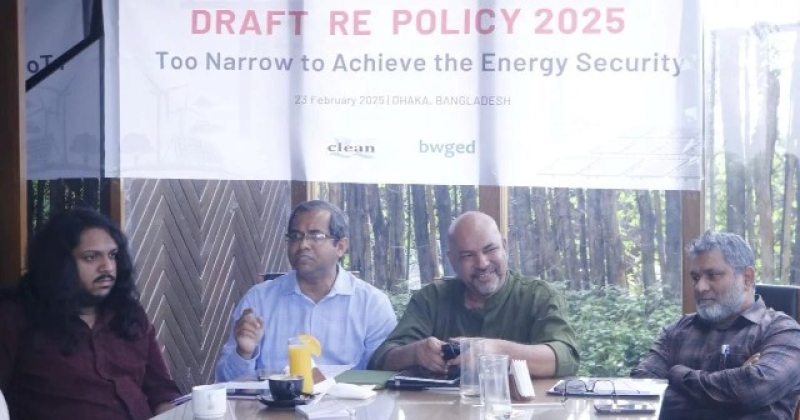- Power generation at Payra Thermal Power Plant 1st unit starts after a month |
- Irregularities, injustice will no longer be accepted in politics: Jamaat Ameer |
- 2 arrested in Jhenaidah for allegedly selling madrasa student |
- Koko’s wife campaigns for Tarique in Dhaka-17 |
- Bangladeshi Expats Cast 4.58 Lakh Postal Votes |
Draft Renewable Energy Policy fails to back viable transition

Coastal Livelihood and Environmental Action Network (CLEAN) addressed a press conference at a city hotel on Sunday._11zon
The proposed targets of the draft Renewable Energy (RE) Policy 2025 will fail to ensure the country’s energy security, according to experts.
Instead, the policy is expected to increase reliance on fossil fuels, enable higher corporate profits, and impose greater financial burdens on citizens.
Coastal Livelihood and Environmental Action Network (CLEAN), a non-governmental organization, raised these concerns during a press conference held at a hotel in the capital on Sunday.
Consultants from the Sustainable and Renewable Energy Development Authority (SREDA) prepared the draft policy via a consulting firm before submitting it to the Ministry of Power, Energy, and Mineral Resources.
Hasan Mehedi, Chief Executive of CLEAN, said, “Bangladesh faces a persistent lack of coordination in formulating renewable energy policies, leading to stagnation in the sector and heightened dependence on expensive imported fossil fuels.”
He highlighted that the government took over four years to draft the policy, reflecting the absence of a comprehensive energy and power master plan. “This lack of a long-term roadmap complicates decision-making. Moreover, allowing merely 21 days for civil society and expert feedback on the draft policy is an insufficient timeframe,” he added.
Mehedi noted that the draft policy sets unrealistically low renewable energy targets—6,145 MW (20%) by 2030 and 17,470 MW (30%) by 2041—without a clear decarbonization strategy. It also omits a green taxonomy, a feature integrated into frameworks of many nations. Additionally, the policy lacks inter-ministerial coordination plans, implementation strategies, and financing roadmaps for renewable energy.
He criticized the disparity in incentives: “While companies implementing renewable energy projects receive full tax exemptions for 10 years and partial exemptions for five years, ordinary citizens are granted no tax benefits. Other nations offer up to 30% subsidies for rooftop solar installations, but this draft ignores such provisions.”
Khondaker Golam Moazzem, Research Director at the Centre for Policy Dialogue (CPD), remarked, “The government’s hurried approach has resulted in an incomplete and superficial policy. Expanding renewables within a fossil fuel-dominated economy is impractical.” He also emphasized the policy’s failure to address the critical need for foreign direct investment (FDI).
Bareesh Hasan Chowdhury, Coordinator of Friends of the Earth Asia Pacific, said, “While most countries have adopted net-zero targets, Bangladesh has yet to establish such a goal.”
Shahriar Ahmed Chowdhury, Director of the Center for Energy Research, observed, “Bangladesh lags behind nations like China, India, Pakistan, and Vietnam in renewable progress. The sector remains neglected as the country continues to prioritize fossil fuel interests.” - UNB

